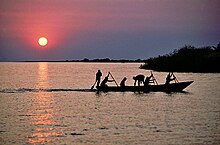Economy of Burundi

Fisherman on Lake Tanganyika
|
|
| Currency | Burundian franc (BIF) |
|---|---|
| Calendar year | |
|
Trade organisations
|
AU, WTO |
| Statistics | |
| GDP | $3.152 billion (2010[update]) Rank: 173rd (2008[update]) |
|
GDP growth
|
4.5% (2008[update]) |
|
GDP per capita
|
$425 (2008[update]) |
|
GDP by sector
|
agriculture (32.9%), industry (21.3%), services (45.8%) (2008[update]) |
| 10% (2008[update]) | |
|
Population below poverty line
|
53% (2010[update]) |
|
Labour force
|
4.08 million (2010[update]) |
|
Labour force by occupation
|
agriculture (89%), industry (5.3%, services (4.1%) (2002[update]) |
| Unemployment | N/A (2008[update]) |
|
Main industries
|
light consumer goods such as blankets, shoes, soap, assembly of imported components, public works construction, food processing Agriculture: coffee, cotton, tea, corn, sorghum, sweet potatoes, bananas, manioc (tapioca); beef, milk, hides |
| 157th (2017) | |
| External | |
| Exports | $88 million f.o.b. (2010[update]) |
|
Export goods
|
coffee, tea, sugar, cotton, hides |
|
Main export partners
|
|
| Imports | $286 million f.o.b. (2010[update]) |
|
Import goods
|
capital goods, petroleum products, foodstuffs |
|
Main import partners
|
|
|
Gross external debt
|
$820 million (2010[update]) |
| Public finances | |
| Revenues | $280.4 million 2009[update]) |
| Expenses | $351.3 million (2008[update]) |
| Economic aid | $90.7 million (2010[update]) |
Burundi is a landlocked, resource-poor country with an underdeveloped manufacturing sector. The mainstay of the Burundian economy is agriculture, accounting for 54% of GDP in 1997. Agriculture supports more than 70% of the labour force, the majority of whom are subsistence farmers. Although Burundi is potentially self-sufficient in food production, the ongoing civil war, overpopulation, and soil erosion have contributed to the contraction of the subsistence economy by 25% in recent years. Large numbers of internally displaced persons have been unable to produce their own food and are largely dependent on international humanitarian assistance. Burundi is a net food importer, with food accounting for 17% of imports in 1997.
Little industry exists except the processing of agricultural exports. Although potential wealth in petroleum, nickel, copper, and other natural resources is being explored, the uncertain security situation has prevented meaningful investor interest. Industrial development also is hampered by Burundi's distance from the sea and high transport costs. Lake Tanganyika remains an important trading point. The trade embargo, lifted in 1999, negatively impacted trade and industry. Since October 1993 the nation has suffered from massive ethnic-based violence which has resulted in the death of perhaps 250,000 people and the displacement of about 800,000 others. Foods, medicines, and electricity remain in short supply.
Burundi is heavily dependent on bilateral and multilateral aid, with external debt totalling $1.247 billion (1.247 G$) in 1997. A series of largely unsuccessful 5-year plans initiated in July 1986 in partnership with the World Bank and the International Monetary Fund attempted to reform the foreign exchange system, liberalize imports, reduce restrictions on international transactions, diversify exports, and reform the coffee industry.
...
Wikipedia
